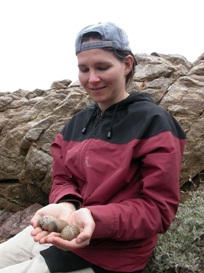Tropical reefs are known to be teeming with biological diversity and density, which can make life difficult for a little fish trying to make it. Add in competition from mom and dad and nowhere to hide from predators, and you’ve… Read more ›
Rising temperatures as a result of climate change promise to alter the behaviors of temperature-sensitive organisms. But climate change is also affecting the timing of seasons, which can throw off the alarm clock for critical behaviors, such as breeding. In… Read more ›
The success of an animal or plant is determined by how many offspring it produces. But in some cases, not all offspring are created equal. In the February edition of Field Talk, Jaboury Ghazoul of the Swiss Federal Institute of… Read more ›
Invasive red fire ants from South America have become a major pest in southwestern U.S., bringing their stinging venom and crop-destroying ways. In this edition of Field Talk, we catch up with Tracy Langkilde, assistant professor of biology at Penn… Read more ›
What would make a plant want to stop growing towards the sun and instead grow downward? Michael Wise of the University of Virginia studies a species of goldenrod that grows toward the ground for part of the spring months, creating… Read more ›
The ability to fly is one of the most significant adaptations in animal history. Some birds, however, have opted out of flying – evolutionarily speaking. In this installment of Field Talk, we catch up with Dr. Rory Wilson, a professor… Read more ›
Andrew Altieri, a postdoctoral fellow at Brown University, joins us in this month’s episode of Field Talk to discuss his work examining hypoxic marine systems, known as dead zones. Altieri studies a community of clams and mussels – collectively known… Read more ›
Managing biological invasions is one of ecology’s most difficult challenges. One controversial approach is the use of biocontrol agents, which involves transplanting an invasive’s natural enemies in an effort to control its spread. In this episode of Field Talk, Dean… Read more ›

